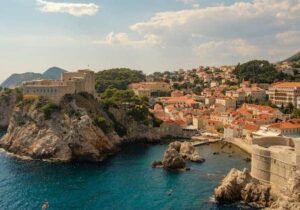
This can extend to parents, grandparents, or even great-grandparents. The rules and extent of generational reach vary significantly among EU countries, and each nation sets its criteria and required documentation, such as birth and marriage certificates, to establish the familial link.
This type of citizenship acquisition is particularly attractive because it usually does not require residency in the country of the ancestor. However, the application process can be complex and requires a thorough understanding of the laws regarding nationality.
This article explores who is eligible for citizenship by descent, which EU countries permit this method of citizenship acquisition and alternative ways to become an EU citizen.
Who Can Get Citizenship by Descent?
EU citizenship by descent is primarily available to individuals who have at least one parent who was a citizen of an EU country at the time of their birth.
However, some European countries extend eligibility to more distant ancestors, including grandparents and great-grandparents, under specific conditions. If you want to obtain European citizenship and, by extension, get an EU passport to move freely throughout other EU countries, there are a few requirements.
Eligibility Criteria
Parental Citizenship: The most prevalent requirement for eligibility is that at least one of the applicant’s parents was a citizen of the country during the time of their birth. This type of lineage is usually easy to establish and requires less extensive documentation as compared to claims based on older ancestral links.
Grandparents and Beyond: Certain countries permit individuals to claim citizenship based on their grandparents or even great-grandparents. Although this is less common, it often involves more intricate documentation to establish the lineage. For instance, Italy and Ireland are countries where citizenship can potentially be claimed through grandparents or great-grandparents if the lineage can be adequately documented and specific conditions are met.
Typical documentation required
Applicants typically need to provide a range of documents to support their claims, depending on the EU country. These may include:
Birth Certificates: To prove direct lineage to the ancestor who has/had European citizenship.
Marriage Certificates: To establish the familial connections between generations.
Death Certificates: Sometimes required to prove the ancestor did not renounce their citizenship before their death.
Proof of Ancestor’s Citizenship: Such as their birth certificate, passport, or other national identification.
Special Circumstances
Reclamation of Citizenship: In some cases, descendants of individuals who lost their citizenship due to historical, racial, or ethnic persecution may reclaim it. For instance, descendants of Jews who fled Germany during the Nazi regime can reclaim German citizenship.
Changes in Borders: Descendants of people from territories that have changed nationalities (due to shifts in national borders) might be eligible for citizenship based on ancestral nationality prior to border changes.
EU Countries that Grant Citizenship by Descent
Several EU countries offer individuals the opportunity to gain citizenship through descent, although the details of these citizenship laws differ. Countries like Ireland, Italy, Poland, and Germany are known for having comparatively straightforward citizenship by descent programs.
Each country has its own legislation regarding how far back you can trace your ancestry to claim citizenship and which documents are necessary to prove your lineage.
Ireland
Irish citizenship by descent is available for individuals with at least one Irish parent or grandparent. If one of your parents was an Irish citizen at birth, you automatically qualify for Irish citizenship.
Additionally, suppose a grandparent was born in Ireland. In that case, you can claim citizenship by registering your birth in the Foreign Births Register before you have a child to ensure citizenship is passed to the next generation.
This system allows families with Irish heritage to maintain a connection with Ireland across multiple generations, providing the right to live, work, and study in Ireland and throughout the European Union.
Italy

This means the Italian ancestors must not have naturalized as citizens of another country before the birth of their child or renounced their Italian citizenship.
Applicants must provide extensive documentation, including birth, marriage, and death certificates from every generation linking them to their Italian ancestors. This allows descendants to reconnect with their Italian heritage and enjoy the benefits of EU citizenship.
Poland
Poland offers the possibility to claim citizenship by descent if you can prove that your ancestors were Polish and held Polish citizenship, and there was no interruption in the citizenship chain before they had children.
Germany
Germany offers citizenship by descent to those born to at least one German parent, irrespective of the place of birth. This right extends to individuals whose parents were German citizens at the time of their birth.
Additionally, descendants of those persecuted and stripped of their German citizenship during the Nazi regime may also be eligible to reclaim German citizenship. Applicants must provide birth certificates and other relevant documentation proving their lineage.
The process ensures that citizenship can be passed down and enables individuals to reconnect with their German heritage, granting them the rights and privileges of living and working throughout the EU.
Greece
Greece offers citizenship by descent to individuals who can prove that one or both of their parents or a grandparent were Greek nationals.
Applicants must provide official documentation such as birth certificates and marriage certificates linking them to their Greek ancestors to claim Greek citizenship. These documents must be registered in the Greek Municipal Records.
The process allows descendants of Greeks to reconnect with their heritage and enjoy the benefits of EU citizenship, including the right to live, work, and travel across the European Union. It’s a pathway that facilitates cultural connection and extends substantial economic and social opportunities across Europe.
Portugal

For grandchildren of people with Portuguese citizenship, the process involves proving the grandparent’s nationality and demonstrating ties to the Portuguese community, which may include language proficiency.
This pathway allows individuals with Portuguese ancestry to connect with their heritage and enjoy the benefits of EU citizenship, such as the right to live, work, and travel freely within the European Union.
Hungary
Like other EU member states, Hungary offers citizenship by descent to those who can prove Hungarian ancestry, typically extending eligibility to individuals with at least one Hungarian parent or grandparent.
The process involves demonstrating the Hungarian citizenship of ancestors at the time of the applicant’s or their parent’s birth, depending on the generational link. Applicants must provide birth and marriage certificates and may need to prove some knowledge of the Hungarian language.
Hungarian Citizenship by Descent enables foreigners to connect with their Hungarian roots. It offers benefits such as the right to live, work, and travel freely within the European Union, leveraging the cultural and economic opportunities it provides.
Spain
Spanish citizenship by descent is a process that allows individuals with a Spanish parent or grandparent to apply for Spanish nationality. Known as “nacionalidad por descendencia,” this process is based on Spanish ancestry and allows those with a direct Spanish lineage to claim Spanish citizenship.
Eligibility includes having at least one parent who is a Spanish citizen, both parents born in Spain, or being adopted by a Spanish citizen before turning 18. People with Spanish grandparents may also apply, and individuals from Latin American countries with a Spanish grandparent are eligible under specific conditions.
Having Spanish citizenship offers various benefits, such as visa-free travel or visa-on-arrival access to over 150 countries and the right to live and work anywhere in the European Union without needing additional permits.
Other EU citizenship options

Each EU member state has specific laws and requirements governing these pathways, and they can differ significantly from one country to another. It is important to note that the European Union itself does not grant citizenship; instead, citizenship is handled by each member state according to its national laws.
Naturalization
The most common way to become a citizen of an EU country is by living there for a specific duration, usually ranging between 5 to 10 years, depending on the laws of the country. During this period, applicants must show that they have integrated into the society, including having proficiency in the local language and knowledge of the country’s culture and legal system. Additionally, applicants must have a clean criminal record and demonstrate financial stability.
Marriage to an EU Citizen: Some countries expedite the citizenship process for spouses of their citizens. This usually requires several years of marriage and, in many cases, a period of residency in the EU country where citizenship is being sought.
Refuge and Protection: Individuals who are granted refugee status or protection can eventually apply for citizenship. This process involves recognition of refugee status, permanent residency, and fulfillment of standard naturalization requirements over several years.
Investment
Several European Union (EU) countries have introduced Golden Visa programs that provide residency permits to non-EU nationals who make significant investments in the country. These investments typically involve purchasing real estate, investing in business ventures, or contributing to government bonds. The residency permit is usually granted for a period of time and can lead to permanent residency and citizenship, usually after 5 to 10 years of continued residency in the country.
Residence by Investment: Similar to investment for Golden Visas, this pathway involves making substantial financial investments but focuses more on long-term residency as a step towards citizenship. This method requires not just investment but also spending a significant amount of time each year in the country.
Special Contributions: Some countries grant citizenship in recognition of special contributions to the state or society, such as significant economic contributions, special talents, or cultural benefits. This pathway is less common and often requires government approval on a case-by-case basis.
How Can Global Citizen Solutions Help You?
Global Citizen Solutions is a boutique migration consultancy firm with years of experience delivering bespoke residence and citizenship by investment solutions for international families. With offices worldwide and an experienced, hands-on team, we have helped hundreds of clients worldwide acquire citizenship, residence visas, or homes while diversifying their portfolios with robust investments.
We guide you from start to finish, taking you beyond your citizenship or residency by investment application.
Frequently Asked Questions About EU Citizenship by Descent
Can I obtain EU citizenship through my grandparents?
Yes, in many EU countries, you can get citizenship by descent (CBD) if you can prove that your ancestors were born in an EU country. This is typically a parent, but you may also need to prove that your grandparents or great-grandparents were born in that country, too.
Is there a generational limit to claiming citizenship by descent?
This depends on the country. Some countries, like Italy, have no generational limit, allowing you to claim citizenship as long as you can prove an unbroken lineage and that no ancestor renounced their citizenship before the birth of the next in line. Other countries might restrict citizenship by descent to one or two generations.
What documents do I need to prove my descent?
Generally, you will need to provide birth, marriage, and death certificates for all generations between you and the EU citizen ancestor. These documents must often be officially translated and certified. You may also need documentation proving your ancestor’s citizenship status at the time of their child’s birth.
How long does the process take to obtain citizenship by descent?
The duration of the process can vary greatly depending on the country and the specifics of your case, including how quickly you can gather the necessary documents and the current processing times of the relevant citizenship authorities. It can take anywhere from several months to a few years.
Do I need to speak the language of the country to claim citizenship by descent?
This requirement varies by country. Some countries do not require you to speak the language if you are claiming citizenship by descent, while others might require language proficiency as part of demonstrating integration and eligibility for citizenship, especially if moving from descent claims to naturalization.



